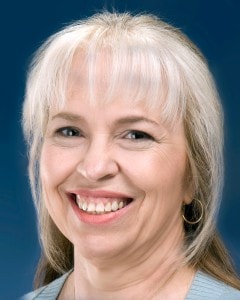how to become a speech pathologist
Career Overview
Helps rehabilitate patients with vocal disorders through voice therapy exercises.
Alternate Titles
Voice Therapist, Speech-Language Pathologist

How To Become a Speech Pathologist
"My job is as a licensed Speech-Language Pathologist with a sub-specialty in voice care and vocal problems," says Joanna Cazden. "Some of my caseload are performing artists; some are not. The fact that I have an arts background helps very much and most of the people in this sub-specialty have some special background in the music or theatre side, as well.
"A typical day on the job is that I drive to an office in a medical building, I sit there and I have a colleague who does similar work and some other related rehab people around us and another person who does our scheduling and stuff. I spend about an hour at a time with people with different kinds of voice disorders, talking with them, doing exercises, and sometimes doing laryngeal massage."
"There's a piano in the room and acoustic testing equipment. Sometimes I do vocal cord exams. I look at vocal cords on the video screen and relate that info to their doctor; everyone I see in that setting has a referral from their doctor and comes to me for rehabilitation."
In addition to the medical professionals in the office where they work, Speech-Language Pathologists may work in tandem with Occupational Therapists who treat musicians for "injuries involving the hand or arm. Those are the other related specialties that are sister professions to what I do," Cazden explains. (Note: Speech Pathologists who specialize in vocal issues are also known as Voice Therapists.)
On average, Speech Pathologists earn approximately $60,200 annually. The salary range for Speech Pathologists runs from $44,000 to $84,000.
As has been mentioned, Speech Pathologists are salaried employees. Cazden adds, "There are some practices where they do their own billing fees for services, but even there it's probably an hourly rate and the business keeps the overhead. Obviously, medical funding is a whole other story."
Let us know which career you are most interested in. Start hereStart here
Speech Pathologists hold set office hours during the day. "The typical person who does my kind of work is likely to be in a medical office practice with doctors working kind of elbow-to-elbow, sitting in on exams, constantly consulting on patients in a somewhat collaborative manner. But still, it's an 'hourly, salaried, work-in-a-medical-office' kind of job," Cazden says.
"There aren't emergencies where you're on call. You show up, you do your hours, you do all your paperwork and sometimes paperwork lapses into unpaid time. My current situation is very rigorous about not doing unpaid time so fortunately, that doesn't happen; it just means I have to do the paperwork that much faster. It's fast-paced. It's intense. There is a lot of paperwork involved, as well as the very unusual human contact dealing with the inside of someone's throat, their medical issues and their performance demands."
Speech Pathologists begin as fellows before attaining certification and becoming full-fledged professionals. "You learn on the job," Cazden says. "The only formal ladder, if you will, is that some people will go for a Ph.D. and be more expected to do actual lab research on, for example, what is the effect of a certain vocal exercise on certain scientific measures of the voice.
A Ph.D. would include becoming (possibly) a faculty member, as most faculty positions require a Ph.D. Otherwise, you just do your job. You're required to get a certain amount of continuing education every year and if you do all that education in this specialty area you'll keep learning and being challenged by patients and gradually develop expertise, networks, and referrals."
The employment trajectory for a Speech Pathologist is straightforward: attend a degree program in the field, complete a fellowship, apply for open positions. Although some fortunate students are able to secure employment directly through the facility where they complete their fellowship, Cazden cautions, "that varies very widely.
"There are maybe half a dozen fellowships available that are just in voice, but most of the time people are going to do their fellowship in some more general medical setting then gradually try to work toward a job where they're more specialized. But they might not find that right away. You have to have a tolerance for working with other kinds of speech and language disorders" till you may be able to find an opening for the more specialized field of voice therapy.
- Look around at the universities near you and see who has a Speech Pathology training program and go talk to the Director. They may have a Professor who's very strong in the field of voice. They may refer you to go talk to another university that has more of that specialty available.
- If the person knows anybody who works in education or health care, ask if they know any Speech Therapists. Most Therapists are willing to give informational interviews and just chat with you. Most of us really like our jobs and you know, we're communicators!
Although they must have an extensive academic background in their field, Speech-Language Pathologists also learn a considerable amount while taking part in their required fellowship. Fortunately, Cazden tells us, "You get a lot of practice training during the formal study. Some people take extra jobs as volunteers in medical centers or educational settings; those are the two places where Speech Therapists, in general, work, in either school systems or medical settings.
"On top of that, there are some very specific training programs. There's a three-week intensive for voice care that most people go through at some point, either through their studies or afterward. There are lots of conferences and things because this is a tiny specialty within the broader Speech-Language field. You get trained as a generalist so you can get work, so you have to have a high tolerance for that work [if you really want to specialize]."
She adds, "It's really helpful if the person has a musical understanding and lifestyle, and understands musical demands in addition to the medical science things."
"You need to be very well organized, detail-oriented, have a high tolerance for bureaucracy and regulations and yet be willing to communicate in a human, creative way within that structure," Cazden says. Since an intense period of academic study is required and the field itself is very small, a passion and commitment for the work are also integral.
A college degree in Speech-Language Pathology is a must for aspiring practitioners. "It's a relatively rigorous path," Cazden says. "To be licensed and certified in my work requires a master's degree.
"There are undergrad prerequisites and if they don't choose this as an undergraduate major they may have to fill in some requirements before applying to a program. It's two or three years of pretty intense graduate study and then once you graduate there's a paid fellowship where you're under pretty close supervision. After that, you get a national certification and a state license, which is like a medical license. It's a long haul and it's not for the faint of heart."
"Our national association is called ASHA (the American Speech–Language–Hearing Association)" Cazden says. "That would be one place to start.
"I would also suggest looking at an organization called the Voice Foundation, a group that encourages networking and conferences that bring together Ear, Nose, and Throat Doctors, Speech Pathologists, Singing and Theatre Teachers, and students in all those fields to share knowledge, information and perspectives about the voice.
"There is a yearly big symposium that anybody can go to. There's a student rate. Some of it is pretty deep science, anatomy, and medical stuff but there are workshops and networking time. There are some local chapters people can check out; there's one in LA.
"Another one is the Performing Arts Medicine Association. That includes Occupational Therapists who may specialize in hand therapy and work with musicians that way, plus physical therapy, which can involve dancers or other instrumental musicians like someone who plays bass and develops a shoulder problem or Drummers with knee problems."
What is the single biggest suggestion you would give to someone wanting to get into this career?
"The advice I give to folks who are already in graduate school and looking for a fellowship is not to specialize too quickly. As I've said, it's a very broad field and what we learn working with other kinds of disorders will end up helping even if you really, really want to do voice as a specialty.
"But someone might come in with a voice problem who also had a stroke or another medical condition; it's really helpful if you have some experience with that. So, again, one has to have a broad tolerance for the field in general while maintaining your own particular interest.
"There are very few people in our field who are known for doing voice, so if someone says they're a singer and understand voice from that perspective as well you're going to get those clients because no one else wants them. It's a fascinating overlap."
What's the #1 mistake people make when trying to get into this career?
"People think they have to specialize right away and if they don't get that perfect fellowship in a voice clinic, their career is over. It's not. The graduate school admissions are competitive enough, so just work hard and learn everything you can."
What is the question people should ask about this career but rarely do?
"What's the difference between being a Voice Therapist and being a Voice Teacher?
"People think it's that a Voice Therapist knows more anatomy and hangs out in the medical world, but I think a bigger difference is that we are accountable for every single thing we do. I have to keep notes on my sessions and there are a dozen different people in my chain of command and in the insurance company asking 'did that exercise move the person forward and if not, what are you going to do differently next time?'
"Singing Teachers are not held to that standard. It's a huge ethical difference. We're also more trained in the science of how people learn things, [including both good and bad behaviors]. There's a lot more direct training in the learning process that happens deep inside the body."
If you could describe in one word what makes you successful, what would it be?

- 1. "Speech Pathologist Salaries". Glassdoor.com. published: Dec 22, 2019. retrieved on: Dec 18, 2019
how to become a speech pathologist
Source: https://www.careersinmusic.com/speech-pathologist/
Posted by: falktrards.blogspot.com

0 Response to "how to become a speech pathologist"
Post a Comment